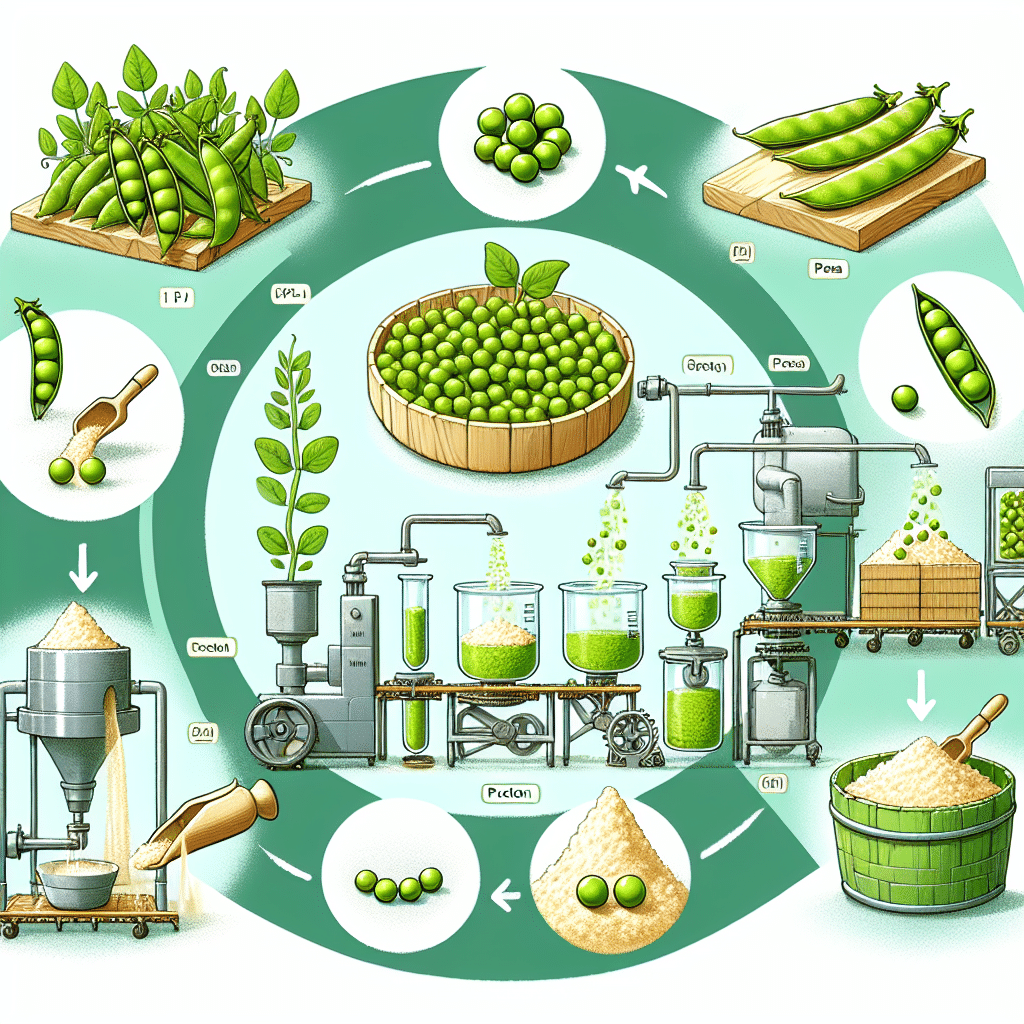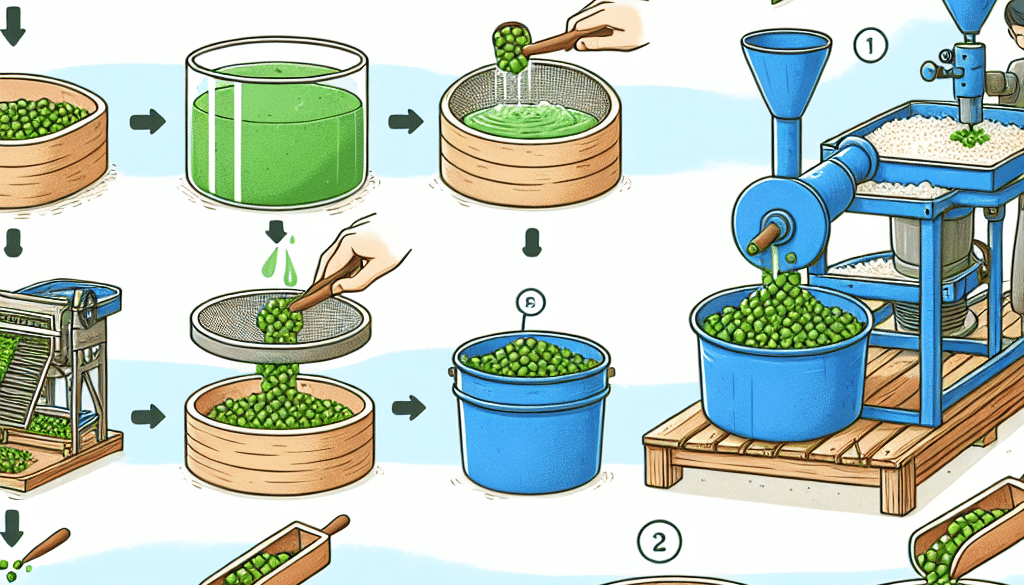How To Make Pea Protein Extract?
-
Table of Contents
- Pea Protein Extract: A Comprehensive Guide to Production
- Understanding Pea Protein
- The Process of Extracting Pea Protein
- 1. Sourcing and Cleaning the Peas
- 2. Grinding the Peas
- 3. Solubilizing the Protein
- 4. Separation and Filtration
- 5. Protein Precipitation and Isolation
- 6. Drying
- 7. Refining and Testing
- Benefits of Pea Protein
- Comparing Pea Protein to Other Protein Sources
- Conclusion: The Future of Pea Protein
- Discover ETprotein’s Premium Pea Protein Products
Pea Protein Extract: A Comprehensive Guide to Production

Pea protein has become a popular alternative to animal-based proteins, especially among vegetarians, vegans, and those with dietary restrictions. Its high protein content, hypoallergenic properties, and sustainability make it an attractive option for consumers and manufacturers alike. In this article, we will delve into the process of making pea protein extract, exploring the steps involved, the benefits of pea protein, and how it compares to other protein sources.
Understanding Pea Protein
Pea protein is derived from yellow split peas and is a high-quality protein that contains all nine essential amino acids. It is particularly rich in branched-chain amino acids (BCAAs), which are crucial for muscle building and repair. Unlike some plant proteins, pea protein is easily digestible and has a low risk of causing allergies.
The Process of Extracting Pea Protein
Extracting protein from peas involves several steps, each critical to ensuring the purity and quality of the final product. Here’s a breakdown of the process:
1. Sourcing and Cleaning the Peas
The first step in making pea protein extract is to source high-quality yellow split peas. Once acquired, the peas are thoroughly cleaned to remove any dirt, debris, or impurities that could affect the quality of the protein.
2. Grinding the Peas
After cleaning, the peas are ground into a fine powder. This increases the surface area, making it easier to extract the protein in subsequent steps.
3. Solubilizing the Protein
The ground pea powder is mixed with water and undergoes a process called solubilization. During this step, the protein is separated from the fiber and starch in the peas. The pH of the solution is often adjusted to optimize protein solubility.
4. Separation and Filtration
Once the protein is solubilized, it is separated from the rest of the pea components through centrifugation or filtration. This step concentrates the protein and removes unwanted materials.
5. Protein Precipitation and Isolation
The protein solution is then subjected to a process called isoelectric precipitation. By adjusting the pH to the protein’s isoelectric point, the protein becomes less soluble and precipitates out of the solution. The precipitated protein is then isolated.
6. Drying
The isolated protein is dried to remove moisture, resulting in a concentrated pea protein powder. This powder can be further processed or packaged as is.
7. Refining and Testing
The pea protein powder may undergo additional refining to remove any remaining impurities or to improve its texture and solubility. The final product is rigorously tested to ensure it meets quality and safety standards.
Benefits of Pea Protein
Pea protein offers several advantages over other protein sources:
- Sustainability: Peas require less water and land to grow than animal-based proteins, making pea protein a more sustainable choice.
- Hypoallergenic: Pea protein is naturally gluten-free and does not contain common allergens found in dairy or soy proteins.
- Nutrient-Rich: In addition to being a complete protein, pea protein is also rich in iron and arginine, an amino acid beneficial for heart and blood vessel health.
Comparing Pea Protein to Other Protein Sources
When compared to whey, soy, or rice protein, pea protein holds its own in terms of nutritional value and digestibility. It is often considered more environmentally friendly than whey (which is dairy-based) and is a more complete protein than rice protein. Unlike soy protein, pea protein is not a common allergen and does not have the same concerns regarding phytoestrogens.
Conclusion: The Future of Pea Protein
As the demand for plant-based proteins continues to grow, pea protein is well-positioned to become a staple in the diets of health-conscious consumers. Its production process, which emphasizes sustainability and allergen-free properties, along with its nutritional benefits, make it a compelling choice for both manufacturers and consumers.
Discover ETprotein’s Premium Pea Protein Products
If you’re looking for high-quality pea protein extract, ETprotein offers a range of organic and non-GMO protein products that cater to various industries. Their pea protein is characterized by a neutral taste and is free from common allergens, making it an excellent choice for your protein needs.
About ETprotein:
ETprotein, a reputable protein and L-(+)-Ergothioneine (EGT) Chinese factory manufacturer and supplier, is renowned for producing, stocking, exporting, and delivering the highest quality organic bulk vegan proteins and L-(+)-Ergothioneine. They include Organic rice protein, clear rice protein, pea protein, clear pea protein, watermelon seed protein, pumpkin seed protein, sunflower seed protein, mung bean protein, peanut protein, and L-(+)-Ergothioneine EGT Pharmaceutical grade, L-(+)-Ergothioneine EGT food grade, L-(+)-Ergothioneine EGT cosmetic grade, L-(+)-Ergothioneine EGT reference grade and L-(+)-Ergothioneine EGT standard. Their offerings, characterized by a neutral taste, non-GMO, allergen-free attributes, with L-(+)-Ergothioneine purity over 98%, 99%, cater to a diverse range of industries. They serve nutraceutical, pharmaceutical, cosmeceutical, veterinary, as well as food and beverage finished product distributors, traders, and manufacturers across Europe, USA, Canada, Australia, Thailand, Japan, Korea, Brazil, and Chile, among others.
ETprotein specialization includes exporting and delivering tailor-made protein powder and finished nutritional supplements. Their extensive product range covers sectors like Food and Beverage, Sports Nutrition, Weight Management, Dietary Supplements, Health and Wellness Products, and Infant Formula, ensuring comprehensive solutions to meet all your protein needs.
As a trusted company by leading global food and beverage brands and Fortune 500 companies, ETprotein reinforces China’s reputation in the global arena. For more information or to sample their products, please contact them and email sales(at)ETprotein.com today.












